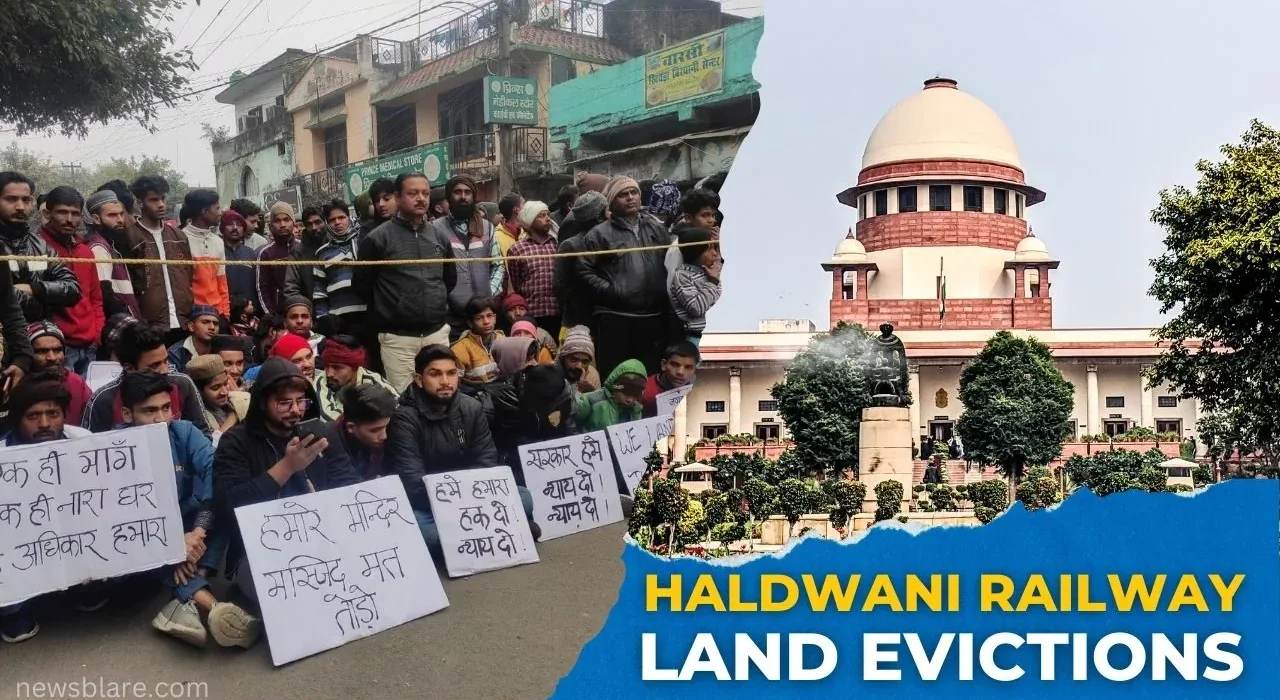The Supreme Court has instructed the central and Uttarakhand state governments to create a rehabilitation plan for over 50,000 people living on encroached railway land in Haldwani before Haldwani railway land evictions. This order came after a plea from the Centre to lift a stay order preventing the removal of these encroachments.
Meeting to Plan Rehabilitation
A three-judge bench, led by Justice Surya Kant, with Justices Dipankar Datta and Ujjal Bhuyan, ordered the Uttarakhand Chief Secretary to meet with the Centre and railway authorities. The goal is to develop a plan to rehabilitate the affected residents before Haldwani railway land evictions. The court stressed the need to balance the rights of these long-term residents with the necessity of expanding railway infrastructure.
Justice Kant emphasized, “Families have lived on this land for decades. They are human beings. Courts cannot be ruthless. There needs to be a balance. The state must do something.” The court directed authorities to identify the land needed for railway expansion and the families affected within four weeks.
J Kant: The ultimate thing is that they are human beings, and they have been living for decades…courts cannot be ruthless, the Courts also need to maintain a balance and state need to do something #SupremeCourt
— Live Law (@LiveLawIndia) July 24, 2024
Background of the Haldwani Encroachment case
The Supreme Court’s involvement began after the Centre sought to vacate the court’s stay on the Uttarakhand High Court’s January 2023 order. The order required the removal of encroachments from 29 acres of railway land in Haldwani. The Railways reported that about 30.04 hectares of land which is home to 4,365 houses had been encroached upon.
This affects over 50,000 people. Additional Solicitor General Aishwarya Bhati argued for lifting the stay citing the need for land to implement railway expansion plans. She told Haldwani’s importance as the gateway to the Kumaon region.
Residents’ Concerns and Protests
Residents of Banbhoolpura in Haldwani have lived on this land for decades. Some claim residency dating back to India’s independence. They approached the Supreme Court in 2023 against the High Court’s eviction order, which led to widespread protests. Residents argue that their long-term presence has been officially recognized. They have entries in municipal records, regular payment of house taxes, and essential services like gas, water connections, and Aadhaar cards.
Read Also: Kolkata Rape Case: Victim was bIeeding from eyes, was murdered after being sexually assaulted
Supreme Court’s Stance on the Issue
The Supreme Court acknowledged the complexity of the issue. It emphasized the need for human treatment of the residents while addressing legal land use requirements. Justice Kant stated, “Assuming they are encroachers, the ultimate question is whether they are all human beings. They have lived there for decades. These are all permanent houses. Courts cannot be ruthless, but they also cannot encourage encroachment.”
The court’s directive calls for immediate action with a detailed rehabilitation plan expected soon. The residents of Banbhoolpura hope the final decision will consider their prolonged habitation and the legitimacy of their claims. The next hearing is scheduled for September 11.
The court instructed the Uttarakhand Chief Secretary to work with the Centre and railway authorities. The focus is on identifying the strip of land needed for railway expansion and the families likely to be affected. A site must be proposed for relocating these families. The exercise must be completed within four weeks.
The Supreme Court’s intervention is based on a petition by Abdul Mateen Siddiqui v. UoI and others, diary number 289/2023. The court aims to ensure a fair, just, and equitable solution for all parties involved. The matter will be reviewed again on September 11, 2024.
Also Read: Your 9-5 Job Will Be Extinct by 2034 LinkedIn co-founder predicts

1 Comment